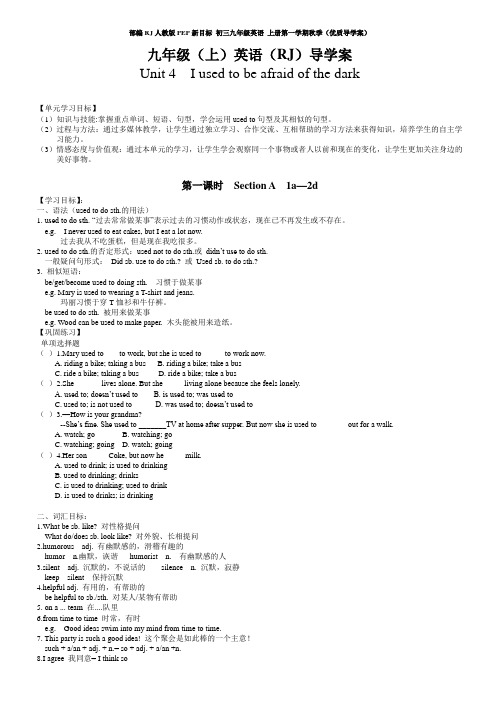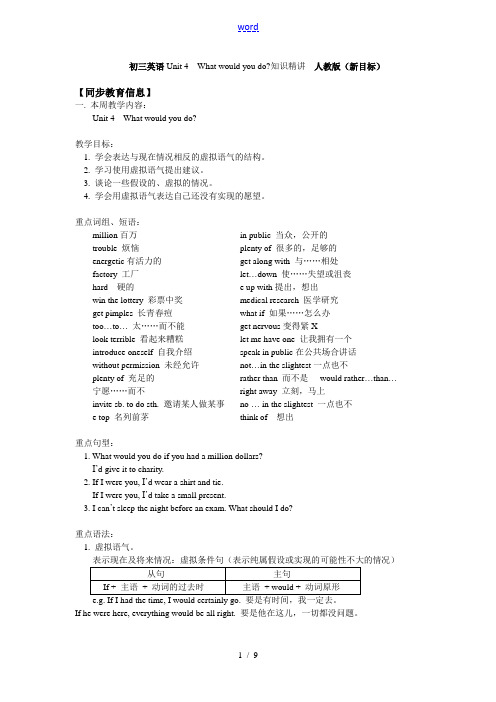新目标初三英语unit4单元复习
人教新目标九年级初三英语Unit4一课一练习(含答案)

Unit 4 I used to be afraid of the dark.Section A (1a—2d)Ⅰ. 根据句意,用括号内所给单词的适当形式填空。
1. The show was so ________(humor) that all the people laughed.2. What’s wrong? Why are you so ________(silence)?3. It’s ________(help) to read the map before you travel to a new place.4. John gets good ______ (score) in his tests every time.5. Sally is a good girl and she is ________(friend) to others.Ⅱ. 根据各题后括号内的要求完成下列各题,每空一词(含缩略形式)。
1. Bob used to be very serious. (改为一般疑问句)________ Bob ________ to be very serious?2. Jim has changed so much. (改为感叹句)________ ________ Jim has changed!3. Her face turned red when she talked to others. (改为否定句)Her face ________ ________ red when she talked to others.4. You used to swim in the lake. (补全反意附加问句)You used to swim in the lake, ________ ________?5. My sister is a little tall now. (对划线部分提问)________ is your sister ________ now?6. She is so brave that she often plays with snakes. (改为同义句)She is ________ ________ to play with snakes.Ⅲ. 根据汉语意思完成英语句子,每空一词。
部编RJ人教版PEP新目标 初三九年级英语 上册第一学期秋季(优质导学案)Unit 4 导学案

九年级(上)英语(RJ)导学案Unit 4 I used to be afraid of the dark【单元学习目标】(1)知识与技能:掌握重点单词、短语、句型,学会运用used to句型及其相似的句型。
(2)过程与方法:通过多媒体教学,让学生通过独立学习、合作交流、互相帮助的学习方法来获得知识,培养学生的自主学习能力。
(3)情感态度与价值观:通过本单元的学习,让学生学会观察同一个事物或者人以前和现在的变化,让学生更加关注身边的美好事物。
第一课时Section A 1a—2d【学习目标】:一、语法(used to do sth.的用法)1. used to do sth. “过去常常做某事”表示过去的习惯动作或状态,现在已不再发生或不存在。
e.g. I never used to eat cakes, but I eat a lot now.过去我从不吃蛋糕,但是现在我吃很多。
2. used to do sth.的否定形式:used not to do sth.或didn’t use to do sth.一般疑问句形式:Did sb. use to do sth.? 或Used sb. to do sth.?3. 相似短语:be/get/become used to doing sth. 习惯于做某事e.g. Mary is used to wearing a T-shirt and jeans.玛丽习惯于穿T恤衫和牛仔裤。
be used to do sth. 被用来做某事e.g. Wood can be used to make paper. 木头能被用来造纸。
【巩固练习】单项选择题()1.Mary used to ___ to work, but she is used to _____ to work now.A. riding a bike; taking a busB. riding a bike; take a busC. ride a bike; taking a busD. ride a bike; take a bus()2.She ______ lives alone. But she_____ living alone because she feels lonely.A. used to; doesn’t used toB. is used to; was used toC. used to; is not used toD. was used to; doesn’t used to()3.—How is your grandma?--She’s fine. She used to _______TV at home after supper. But now she is used to _______ out for a walk.A. watch; goB. watching; goC. watching; goingD. watch; going()4.Her son _____Coke, but now he _____milk.A. used to drink; is used to drinkingB. used to drinking; drinksC. is used to drinking; used to drinkD. is used to drinks; is drinking二、词汇目标:1.What be sb. like? 对性格提问What do/does sb. look like? 对外貌、长相提问2.humorous adj. 有幽默感的,滑稽有趣的humor n.幽默,诙谐humorist n. 有幽默感的人3.silent adj. 沉默的,不说话的silence n. 沉默,寂静keep silent 保持沉默4.helpful adj. 有用的,有帮助的be helpful to sb./sth. 对某人/某物有帮助5. on a ... team 在....队里6.from time to time 时常,有时e.g. Good ideas swim into my mind from time to time.7. This party is such a good idea! 这个聚会是如此棒的一个主意!such + a/an + adj. + n.= so + adj. + a/an +n.8.I agree 我同意= I think so表示不同意时用I don’t agree 或I disagree9.It’s been three years since we last saw our primary school classmates.自从我们上次小学同学见面以来已经有三年的时间了。
新版新目标英语九年级Unit4 Period 3课件

Paula is my friend. She is a good girl.
Describe the changes of these people.
Read 2d
• This party is such a great idea! • I agree. It’s been three years since we last saw our primary school classmates. • It’s interesting to see how people have changed. • Billy has changed so much! He used to be so shy and quiet. • Yeah, his face always turned red when he talked to girls!
A: Did she use to …? B: Yes, she did. She used to … A: What’s she like now? B: She’s … now.
A: Did he use to …? B: Yes, he did. He used to … A: What’s he like now? B: He’s … now.
In the past
Now
1. Paula used to be 1. Now she’s more quiet She was really _____. interested in ______. sports always silent in class. She plays ________ soccer She wasn’t very outgoing ____. almost every day. She was never brave She’s also on the swim team. enough to ask __________ questions. 2. She still plays the 2. She got good grades ________ piano from time to in ____. She was also science time. good in _____. She music class used to play the 朗读、描述Paula ______. piano
九年级英语_Unit_4_What_would_you_do全单元课件_人教新目标版

I get nervous before big parties and then I get pimples. They look terrible! What should I do?
a The food you eat could help with this
problem. You should eat lots of fruits and vegetables and drink lots of water.
I were you , I would go at
也就是说虚拟语气表示和现实的事实 相反时,从句用一般过时。 主句wouldshould//could/might +动词 原形 if …一般过去时/were…
• 1.If I had time, I would go for a walk. • 2.If I were invited, I would go to the dinner party. •3.If I won a million dollars in the lottery, I would put it in the bank.
S: That‟s a good idea. I‟ll try to do what you said.
4 We meet problems every day .Work in groups
to ask others’ problems and give advice. Then Report the result according to your survey.
人教版新目标英语九年级各单元短语复习归纳

人教版新目标英语九年级各单元短语复习归纳Unit 11.XXX通过听磁带2.by working with a group通过小组学3.the best way to do ( = of doing ) sth.做的最好方法4.practice XXX练说英语5.English–speaking friends讲英语的朋友6.XXX写作(听力)练7.XXX提高我的会话技巧8.XXX英语口语9.get XXX对…感兴奋10.get excited about doing ( = to do ) sth.对做…感兴奋11.end up with sth.以…结束12.end up XXX截止做某事,结XXX做某事13.end up XXX以说汉语结束对话14.make mistakes in spelling ( grammar )在拼写(语法)方面出毛病15.how to use。
如何利用。
16.XXX畏惧或人/物17.be afraid to do害怕做,不敢做18.decide ( not ) to do sth。
= decide ondoing = make a XXX定(不)做19.XXX喜欢干…20.XXX建议做21.have trouble doing sth。
= haveproblems doing sth.= have a harddifficult ) XXX做。
有困难22.have fun XXX玩得高兴23.XXX忘记24.try ( = do ) one’s best to do sth.极力做25.with the help of sb。
= with sb.’s help XXX在…的匡助下26.( how ) deal with = ( what )do with对待,处理。
27.XXX担心,担忧28.give sb。
some ns = give sb.some advice给或人提发起29.write them down写下/记下它们30.look ( it。
初三英语Unit4 What would you do知识精讲 人教版(新目标)

初三英语Unit 4 What would you do?知识精讲人教版(新目标)【同步教育信息】一. 本周教学内容:Unit 4 What would you do?教学目标:1. 学会表达与现在情况相反的虚拟语气的结构。
2. 学习使用虚拟语气提出建议。
3. 谈论一些假设的、虚拟的情况。
4. 学会用虚拟语气表达自己还没有实现的愿望。
重点词组、短语:million百万in public 当众,公开的trouble 烦恼plenty of 很多的,足够的energetic有活力的get along with 与……相处factory 工厂let…down 使……失望或沮丧hard 硬的 e up with提出,想出win the lottery 彩票中奖medical research 医学研究get pimples 长青春痘what if 如果……怎么办too…to…太……而不能get nervous变得紧Xlook terrible 看起来糟糕let me have one 让我拥有一个introduce oneself 自我介绍speak in public在公共场合讲话without permission 未经允许not…in the slightest一点也不plenty of 充足的rather than 而不是would rather…than…宁愿……而不right away 立刻,马上invite sb. to do sth. 邀请某人做某事no … in the slightest 一点也不e top 名列前茅think of 想出重点句型:1. What would you do if you had a million dollars?I’d give it to charity.2. If I were you, I’d wear a shirt and tie.If I were you, I’d take a small present.3. I can’t sleep the night before an exam. What should I do?重点语法:1. 虚拟语气。
新目标英语九年级上学期unit 4单元短语单词详解
lotteryu.c. 摸彩〔抽奖给奖法:一种竞赛,其中记号被分配或卖掉,获胜的记号被预先秘密选定或在随意抽奖中最终被确定〕The VP uses a lottery to appoint a secretary. 副总统用抓阄的办法任命自己的秘书。
raffle[ ❒✌♐●]n. c. 抽彩〔贩卖彩票并且给予中奖者物品,通常以募款为目的〕I won this doll in a raffle.我抽彩得了这个玩具。
medicalmedicine n. medically adv.adj. [置于名词前]medical science 医学medical care 医疗 a medical /surgical[ ♦☜♎✞♓☜●]ward 内科/外科病房n. [口语]健康检查researchresearcher n. 调查员n.研究;探讨to do research on blood diseases进行血液病研究[1.复数形式也表示单数意思; 2. 复数时不与many 或数词连用,可用two pieces of …]vi./vt. 研究;探讨to research into the causes of an illness研究发病原因[+into/on +名词,表对…的研究、调查]tietying; fasten[同];untie [反]v.●捆,绑,系Can you tie up this parcel for me?你能替我捆好这个包裹吗?He tied his dog to the fence. 他把狗拴在栅栏上。
●绑带子;系鞋带Tie your shoes.把你的鞋带系上。
●(常与down连用)限制(某人的)自由She is tied down with her baby. 她因为要照顾婴儿而走不开。
n.c. [通常用复数ties] (美语亦称)necktie领带[通常用单数]表示限制行动自由的累赘Young children can be a tie. 小孩子会成为累赘。
新版新目标英语九年级Unit4 Period 8课件
辨析:used to do sth., be used to (doing) sth. 与be used to do sth.
①used to do sth.意为“过去常做 某事”,只用于过去时态。 She used to have long hair. 她过去留着长发。
②be used to (doing) sth.意为 “习惯于(做)某事”,可用于现在、 过去、将来等多种时态 He is used to getting up early. 他习惯于早起床。
4. —Did you use to have straight hair? 你过去是直发吗? —Yes, I did. 是的。 5. —Did you use to play the piano? 你过去弹钢琴吗? —No, I didn’t. 不,我不弹。
6. I used to be short when I was young. 我年轻时个子很矮
6、【江西· 南昌】29.一Are you B dark? ____ the —Oh.yes.I always go to sleep with the light on. A.used to B.afraid of C.interested in D.good with
D 7、【 · 兰州】We have up early in order to catch the early bus. A. used to get B. been used to get C. used for getting D. been used to getting
D 2、【 】16. Her sister ____ a taxi driver. Now she works for a charity. A. is B. were used to being C. is used to being D. used to be
英语人教新目标九年级全一册Unit4 used to的用法
3. used to的一般疑问句结构,其一般疑问句有两种 形式
⑴ Did+主语+use to+动词原形……? 这种一般疑问句,就是把used当做实义动词来看,所以 变一般疑问句时要用助动词did。如: I used to go swimming in the river. →Did you use to go swimming in the river?
一、used to的构成
used to+动词原形
其中to是不定式符号
h. 过去常常做某事,它没有人称和数的变化 。
表示过去存在而今不复存在的习惯行为或状态, 意为:“过去常常”,其中to不定式符号,后接 动词原形,表示今昔对比。如: I used to walk to school, but now I am used to taking the school bus to school. 我过去常常走路上学,但现在我习惯坐校车上学。
⑵ Used+主语+to+动词原形……? 这种一般疑问句是把used当做情态动词,所以变一般疑 问句时,直接把used提到句首。如: He used to go to school by bike.
→ Used he go to school by bike?
四、易混词组辨析
used to do sth. be used to doing sth.
三、used to 的句子结构
1. used to的肯定句结构 主语+used to+动词原形……如:
I used to go to the cinema, but I never have time now. 我过去经常去看电影,但现在没有时间了。
新目标九年级英语unit1--4单元基础知识
九年级英语第一单元检测一.词组翻译1.犯错,出错______________ 2. 结束_____________ 3. 根本不_____________4. 以后,随后____________5. 害怕去做__________6. 嘲笑_______________7. 7做笔记_______________8. 查阅___________9. 编造___________10. 处理______________ 11. 生…… 的气_________ 12. (指时间)过去,消逝__________ 13. 尽力做…… _____________ 14. 突然中止,中断_________________ 15. 没关系________________二.单项选择()1.---- How do you study ______ a test?---- I study ______ working with a group. A: for by B: by in C: for from ()2.Have you ever ______ with a group? A: study B: studying C: studied ()3.My sister said she studied by ________ English-language videos.A: watch B: watching C: watched()4.What about _______ the textbook? A: reading B: read C: to read ()5.It improves my _______ skills A: spoken B: speak C: speaking()6.I have trouble ________ the new words. A: memorize B: memorizing C: to memorize ()7.I don‟t know how ________ commas.A: use B: to used C: used()8.Miss Li regards all his students _______ his children. A: as B: for C: to ()9.If you don‟t know how to spell new words, look them _____ in a dictionary.A: up B: for C: after()10.The small boys decided ________ to each other.A: not talk B: not talking C: not to talk三.根据中文完成句子1.我的叔叔经常询问我的学习情况。
- 1、下载文档前请自行甄别文档内容的完整性,平台不提供额外的编辑、内容补充、找答案等附加服务。
- 2、"仅部分预览"的文档,不可在线预览部分如存在完整性等问题,可反馈申请退款(可完整预览的文档不适用该条件!)。
- 3、如文档侵犯您的权益,请联系客服反馈,我们会尽快为您处理(人工客服工作时间:9:00-18:30)。
